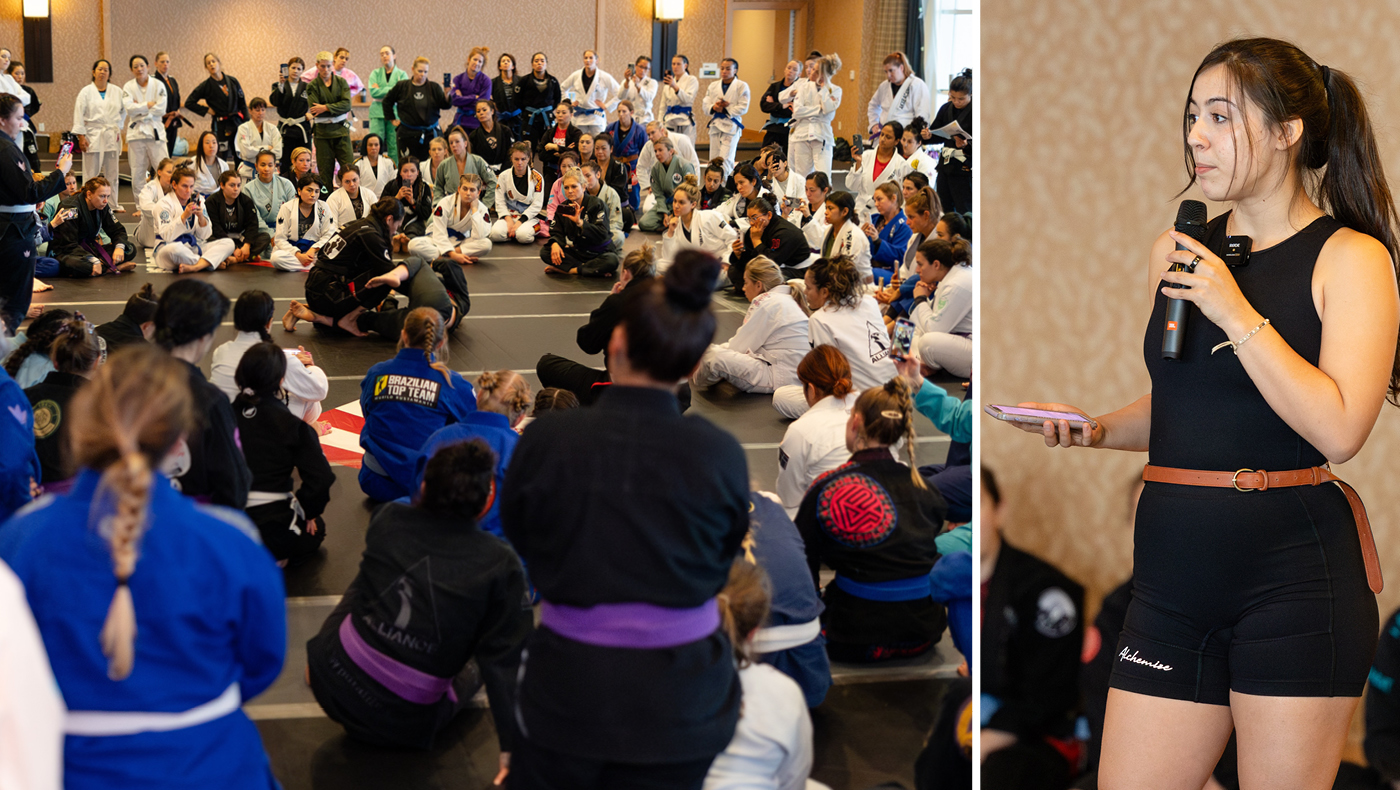Her company headquarters was her student apartment, and her mobile sales office was her car. Four years later, Maya Nazareth has built her passion into a growing enterprise called Alchemize Fightwear.
She was passionate about Brazilian jiu-jitsu, but noticed one irritating problem: The fightwear.
“There just wasn’t a lot of gear that was thoughtfully designed for women,” she recalled. “So I was wearing gear that was very unflattering, that rode up while I was training, and it didn’t fit my body properly.”
About to start her senior year studying international business at the University of Delaware, Nazareth didn’t know much about the industry. But she spent hours in her apartment planning, developing a rashguard, and selling it out of the trunk of her car after jiu-jitsu practice. (A rashguard is a specialized shirt that protects the skin during grappling.)
Alchemize Fightwear was born. Nazareth has built it steadily in the years since, recently announcing that the company more than doubled its business in 2023, and had just shipped its 10,000th order. It’s also hosting Brazilian jiu-jitsu events around the country that bring together hundreds of women, and donates a portion of profits to combat violence against women.
Despite launching the initial phase of her business on her own, Nazareth knew she wanted help and expert input. That’s why she turned to Horn Entrepreneurship.
Horn is part of UD’s Alfred Lerner College of Business and Economics, and promotes entrepreneurship throughout the University. It supports an entrepreneurship major, several minors, and cross-disciplinary certificates. Beyond coursework, Horn offers programs that help budding entrepreneurs refine their startup idea and build their venture.
Nazareth benefited from several of Horn’s classes and workshops that school year, then after her graduation went through its Summer Founders program, which offers students mentorship, training and a stipend as they work on their startups.
That summer brought a lot of clarity to Nazareth’s business ideas, partly by introducing her to the concept of evidence-based entrepreneurship, which calls for meticulous advance research about the market. It was an insight she calls hugely helpful.
“I had never heard that (concept) anywhere,” she said. She knew the challenges that led her to start the business, and why she cared, but didn’t really know if her potential customers felt the same way and what they would want.
That summer, Nazareth spent a lot of time talking to women about problems they faced with fightwear, gathering a wealth of information.
“All those details are what helped us develop a really great product,” Nazareth said, saving her from possibly wasting money on products that didn’t work. She still uses that approach today as a more seasoned business owner.
“I don’t launch something if I don’t know that people are going to love it … we de-risk the business by asking those questions up front.”
She also benefited from mentorship from leaders at Horn, and said she still checks in regularly with them.
“I feel like I would not be where I am today without Horn and these mentors who believed in me,” she said. In particular, she mentioned Vincent DiFelice, senior instructor of entrepreneurship, as an incredible professor and mentor who has had a big impact on her.
The networks she built, she said, have also helped her make important connections in the broader industry as she looks to grow.
“The network and the guidance that I’ve received at Horn has probably been the most valuable thing that I received from the program,” she said.
She’s passed that benefit along, helping mentor students going through Horn’s programs. Last year, she was the featured business in the Carol A. Ammon Case Competition at the Lerner College. Teams of graduate business students came up with ideas for her enterprise, and she served as a judge in the final round.
“There’s a lot of knowledge that I’ve gained, one, through mentorship, but two, through just falling on my face in business, and making mistakes all the time, that I would like to share with people,” Nazareth said.
She sees Alchemize Fightwear as still in the startup phase, but is in the process of scaling up. While Nazareth still does much of the work herself, she’s added full-time staff member Suliy Melendez, has six part time employees and hopes to expand the team further.
As Alchemize Fightwear grows, it remains focused on opening doors for women and is investing in marketing through building community. The company hosts self-defense events every other week at its Philadelphia office. It has also held larger conferences around the country, including a two-day grappling camp in San Diego in January that brought together 250 women. An even bigger three-day event in Austin, Texas, is in the works, aiming to draw 500 women to learn about jiu-jitsu and well-being, with sessions on nutrition, strength training, and mobility, as well as balancing motherhood, life and combat sports, Nazareth said.
Nazareth’s goal is to reach $1.8 million in sales this year, and sheis working to raise $1 million in funding, she said. She’s excited about recent partnerships with large factories. “The next few years, it’s just going to be about scaling and trying to see how much market share we can grab.”
One of the challenges she hopes to address with new funding is actually a positive indicator for the future.
“We’ve grown so fast that oftentimes we’re out of stock,” Nazareth said.




